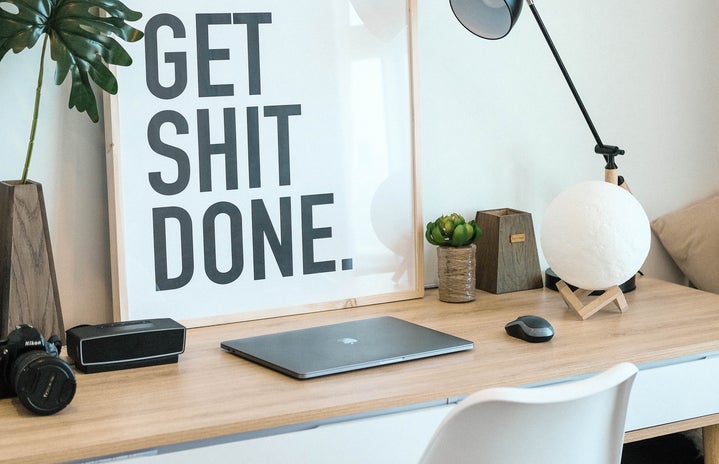After a long and relaxing summer vacation, students generally find it difficult to get back into the groove of early morning lectures, note taking and essay writing. Remember those good ol’ days? You know, when we weren’t in the midst of a global pandemic? Good times. Unfortunately, an extra-large coffee and a nap on one of those plush, red couches at Scott library won’t exactly do the trick this year.
I, like many others, spent my summer of 2020 completing a full course load all whilst confined in my 3 by 3 meter bedroom. I am very aware that my circumstances weren’t nearly as substandard as others. Nonetheless, it was still quite difficult for me to remain motivated and productive during my semester online. Let’s just say I drowned my pillow in stress tears 13 too many times.
After what felt like endless days of staring at my computer screen, pacing the perimeter of my home, and increasingly vigorous leg bouncing, I figured enough was enough. I came to accept that, whether I liked it or not, this was my reality. I could either succumb to the negative self-talk or attempt to take back my power. I replaced my damp pillow case with a dry one and began my Google search. Listed below are some simple yet helpful psych hacks that got me through the rest of my semester:
- Disconnect to Connect
-
Tackling classes online is a major shift from our usual learning regime. It can feel rather suffocating to have to remain in the tight confines of your home “office” space for hours on end. Those cross-campus treks from Vari to McLaughlin aren’t looking so dreary anymore, are they? It’s the opposite, actually. Interestingly enough, nature strolls positively impact our learning and cognition. According to an article by Williams et al. (2018), spending time in a natural environment enables the mind to gently shift between an outward fascination to inward mind-wandering. This provides the foundation for mutually reinforcing pathways that improve attention, enhance mood and promote creativity. If you find yourself feeling overwhelmed or unable to begin your tasks, a fall hike might be just what you need.
- Environment Stimulus
-
According to the theory of classical conditioning in psychology, when a naturally-occurring stimulus is repeatedly paired with an environmental-stimulus, the environmental stimulus will eventually trigger the same response that the natural stimulus elicits. For example, presenting food automatically triggers salivation in dogs. If you begin to sound a bell immediately before presenting the food enough times, the dog will eventually begin to salivate to the sound of the bell alone. In the same way, by associating your school work with a particular environment in your home, you may increase your productivity. During my time in quarantine, I created a small office-like space for myself. I created a work schedule and decided that I would only do homework from 9 a.m.–3 p.m. on Monday through Friday. So, in accordance with this theory, I would open the door to that room every day at 9 and close it at 3, thereby dissociating that space from all unrelated tasks and distractions.
- Accountability Buddy
-
Choose a non-judgmental friend who you can share your goals with. This is a person who can verbally motivate and socially reinforce you to keep your commitments. Pairing up with another person to tackle a personal challenge can make the process fun and exciting. It’s a two-way support system for ensuring you complete your responsibilities.
- Set Up A Reward System
-
We all deserve to treat ourselves here and there, so why not do it strategically? In psychology, we call this little number operational conditioning, which is essentially a fancy way of saying: girl, go buy yourself that iced chai latte with pumpkin cold cream to embrace the fall aesthetic! Create a personalized reward system for accomplishing both short and long-term goals. Better yet, why not reward your perfectly highlighted notes with cash? By becoming an elite notetaker for OneClass or StudySoup, you can earn some money by submitting your class-notes.
- Enclothed Cognition
-
“You look like hell!” is a perfect example of the sweet words of encouragement my lovely brother would frequently offer me over these past few months. The oversized t-shirt and paint-stained Walmart track shorts I would wear for four days straight, however, would readily disagree. Little did I know, he was onto something. According to Adam and Galinsky (2012), “enclothed cognition” is a term used to describe the influence that our clothing has on our psychological processes. In this study, physically wearing a lab coat increased the wearer’s attentiveness and carefulness compared to those not wearing a lab coat. Wearing power clothing may allow us to feel more confident and dominant. Perhaps then, by getting dressed in professional clothing during Zoom calls at home, we may psychologically enhance our performance.
While some of these tips and tricks may provide temporary relief, they do not address chronically low motivation or deep-rooted stress. We are living in a particularly uncertain time. If you are experiencing chronic burnout or just need someone to talk to, be sure to reach out to a professional. Some resources that may help you include: Good2Talk, Student Counselling & Development and Accessibility Services. Best of luck!


